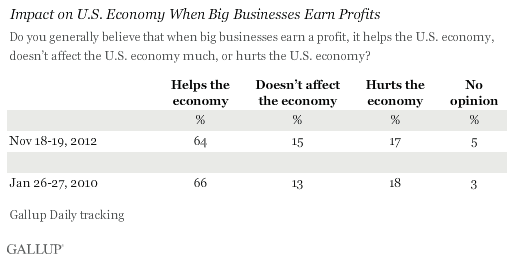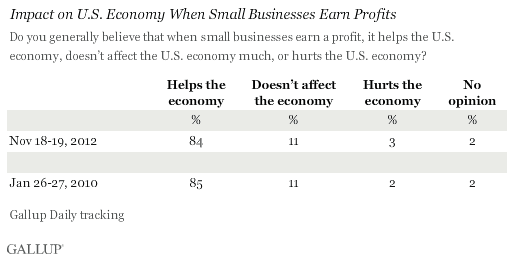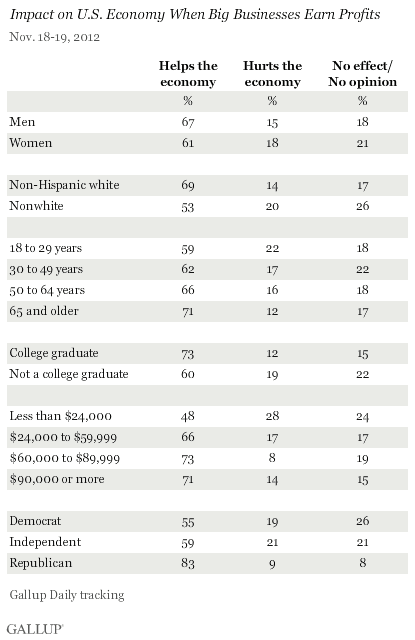PRINCETON, NJ -- Americans think the U.S. economy benefits when big businesses or small businesses make a profit, although, by 84% to 64%, more consider small-business profits helpful. Relatively few believe profits made by either type of business are harmful to the economy. None of these views have changed appreciably in nearly three years.


Americans' generally positive view of profits big businesses make is notable, given their relatively muted ratings of big business more generally, particularly relative to small business. In the same poll, conducted Nov. 18-19, 58% of Americans told Gallup they have a positive image of big business, while 95% had a positive image of small business, a 37-percentage-point gap.
Similarly, in June Gallup found 21% of Americans expressing a great deal or fair amount of confidence in big business as an institution, in contrast to 63% having high confidence in small business -- a 42-point gap.
View of Big-Business Profits Strongly Related to Party ID, Race, and Income
Large majorities of all major demographic and political groups believe small-business profits help the economy. Most groups also believe big-business profits are helpful; however, views toward this differ significantly by politics, income, and race, mirroring what Gallup found in 2010.
- Eighty-three percent of Republicans -- in contrast to 55% of Democrats and 59% of independents -- say the economy benefits when big businesses make a profit. This is a rare instance in which independents' views are much closer to those of one party than the other -- in this case, to Democrats' views. As a result, Republicans' high support for big-business profits sets them apart.
- Fewer than half of low-income Americans -- 48% of those making less than $24,000 per year -- believe it helps the economy when big businesses earn a profit. This rises to 66% among those earning between $24,000 and $59,999 annually, and to over 70% among those earning $60,000 or more.
- Two-thirds of non-Hispanic whites versus barely half of all nonwhites -- 69% vs. 53% -- see big-business profits as positive for the country.
Sizable minorities of each subgroup have no opinion about the impact of business profits on the economy or believe they have no effect. This leaves at most 28% saying these profits hurt the economy.

Smaller, but still significant differences are seen on the basis of age and education, with seniors and college graduates more positive about big-business profits than are young adults and college nongraduates. In fact, the 22% of 18- to 29-year-olds saying big-business profits hurt the economy is among the highest seen for any demographic subgroup.
Bottom Line
Profit is perhaps the chief motive for individuals and businesses to take the financial risks needed to start or expand a business, and is thus a driving force of capitalism. However, corporate profits have been the target of criticism in recent years, chiefly from the Occupy Wall Street movement, which has called out the "1%" for reaping unfair economic benefits. Starting with a rally in New York City on Sept. 17, 2011, Occupy Wall Street activists have equated corporate profits with corporate greed, and called for higher taxes on corporations -- they say to rectify a growing economic divide. Later in 2011, they attempted to derail business profits directly, by shutting down a major shipping port in Portland, Ore., for a time.
Big business is not wildly popular in America, particularly relative to small business. However, despite recent efforts to draw national attention to the perceived economic pitfalls of corporate wealth, nearly two-thirds of Americans still believe the profits big businesses make are more helpful than harmful to the nation's economy.
Importantly, the public's views on this are virtually unchanged from January 2010, spanning the emergence of the Occupy Wall Street movement. To the extent there is public concern about corporate profits being harmful, it is greater among nonwhites, college nongraduates, those in households earning less than $24,000 per year, and -- potentially important for the future -- adults under age 30, although even among these groups it is the minority view.
Survey Methods
Results are based on telephone interviews conducted as part of Gallup Daily tracking Nov. 18-19, 2012, with a random sample of 1,040 adults, aged 18 and older, living in all 50 U.S. states and the District of Columbia.
For results based on the total sample of national adults, one can say with 95% confidence that the maximum margin of sampling error is ±4 percentage points.
Interviews are conducted with respondents on landline telephones and cellular phones, with interviews conducted in Spanish for respondents who are primarily Spanish-speaking. Each sample includes a minimum quota of 400 cellphone respondents and 600 landline respondents per 1,000 national adults, with additional minimum quotas among landline respondents by region. Landline telephone numbers are chosen at random among listed telephone numbers. Cellphone numbers are selected using random-digit-dial methods. Landline respondents are chosen at random within each household on the basis of which member had the most recent birthday.
Samples are weighted by gender, age, race, Hispanic ethnicity, education, region, adults in the household, and phone status (cellphone only/landline only/both, cellphone mostly, and having an unlisted landline number). Demographic weighting targets are based on the March 2011 Current Population Survey figures for the aged 18 and older non-institutionalized population living in U.S. telephone households. All reported margins of sampling error include the computed design effects for weighting and sample design.
The questions reported here were asked of a random half-sample of respondents for two nights on the Gallup Daily tracking survey.
In addition to sampling error, question wording and practical difficulties in conducting surveys can introduce error or bias into the findings of public opinion polls.
View methodology, full question results, and trend data.
For more details on Gallup's polling methodology, visit www.gallup.com.
